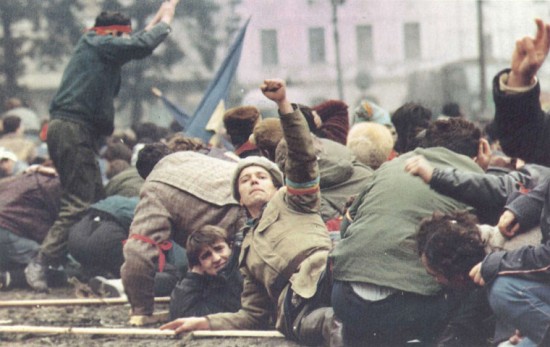
1. Definition of Communism
The basis for communism is the universal ownership of all property and goods, resulting in the equality both socially and economically of everyone in the community. Communism also preaches that each man works for himself and is not controlled by the business owner, so the worker shares in the profits.
2. The Collapse of Communism Known by Many Titles
The Collapse of Communist government after 75 years of rule is referred to by many other names. The most common are the Fall of Communism, the Revolution of 1989, the Autumn of Nations and the Revolutions of Central and Eastern Europe. All of these names refer to the revolutions in Europe that led up to the overthrow of communist government.
3. Communist Countries in Eastern Europe
The Eastern Bloc nations make up the communist countries of Eastern and Central Europe. The Communist Bloc includes the former communist states of the Soviet Union and the Warsaw Pact countries. The Eastern Bloc countries include Poland, East Germany, Hungary, Czechoslovakia, Bulgaria, Romania, Albania and Yugoslavia.
4. Economic Oppression and Famine
Although Utopian in theory, the communist government resulted in economic, environmental and social disaster. Widespread hunger and unemployment made life under communist rule mediocre at best. The people suffered through shortages of goods and food, having to stand in lines to get the basics for life. Housing was in crisis, with people having to share apartments with strangers. The secret police, known as “stasi,” tyrannized the people, leaving them disgruntled with the government and spiritually hopeless. They did not volunteer for civic duties and saw no hope for the future. The people in communist countries longed for individual freedom, privacy, economic stability and a means to raise a family with the basic amenities of life. Millions of people began applying for visas to leave their countries for a better life.
5. Hope for Freedom Spread through the Media
The media and technology kept the people in Europe’s communist countries informed about what democracy had to offer. Television, Radio Free Europe, the BBC and Voice of America brought news from the rest of the world, making the people yearn for freedom. Television broadcasts also informed the people that the government in their countries was falling apart and promoted the liberty outside of communist countries. The communist government was unable to keep the people in the dark about the government crisis.
6. Poland First to Form a Democracy
Poland was the first country to denounce communism and begin democratic elections in 1989. The Catholic population of Poland and the trade union solidarity was significant in the development of a free market, free elections and the fall of communism in the country. One year later, Lech Walesa became Poland’s first President under democracy.
7. Demonstrations for Freedom
During the same time that Poland declared democracy, other European communist countries, especially Romania, Bulgaria and Czechoslovakia, were demonstrating for free elections and freedom of the press. In 1989, Hungary tore down the fences and barbed wire that kept them from entering Austria. Thousands of people escaped from East Germany and Hungary, travelling through Austria, never to return.
8. Soviet Leader, Mikhail Gorbachev Opens the Way to Democracy
Soviet Premier, Mikhail Gorbachev attempted to initiate reforms to communism but was unsuccessful. His warning to the East German government emphasized the need to listen to the people’s cries for freedom did have an impact on the fall of communism. The people’s protests became stronger in East Germany and on November 9, 1989, the media announced that citizens could now travel into West Germany. The next day, the Berlin Wall, that stood since 1961 was demolished.
9. Dissolution of the Soviet Union
In 1991, the Soviet Union suddenly disintegrated with very little violence. It is amazing that communism in the Soviet Union faded away peacefully, especially in Russia. The decline in military growth and economy, agricultural crisis, lack of incentive for the people to work and excessive prohibitions contributed to the Soviet Union’s collapse.
10. Perestroika Cannot Save Communism
Mikhail Gorbachev began liberal reforms to communism in 1985 when he took the place of Brezhnev. These reforms were known as perestroika and opened communication with the West and economic diversity. In spite of the reforms, communism and the Soviet Union continued to crumble and in 1991 collapsed completely.

Leave a Reply